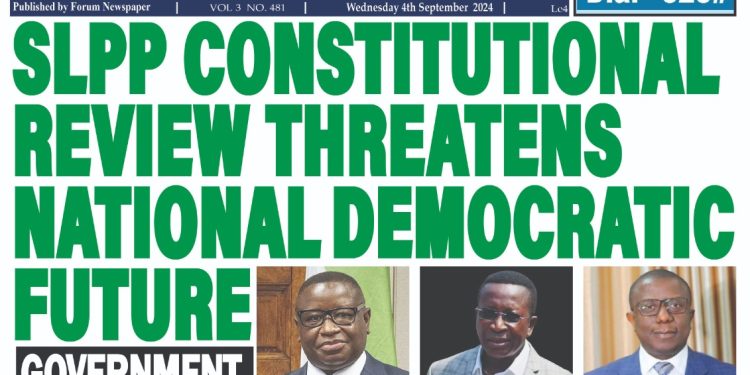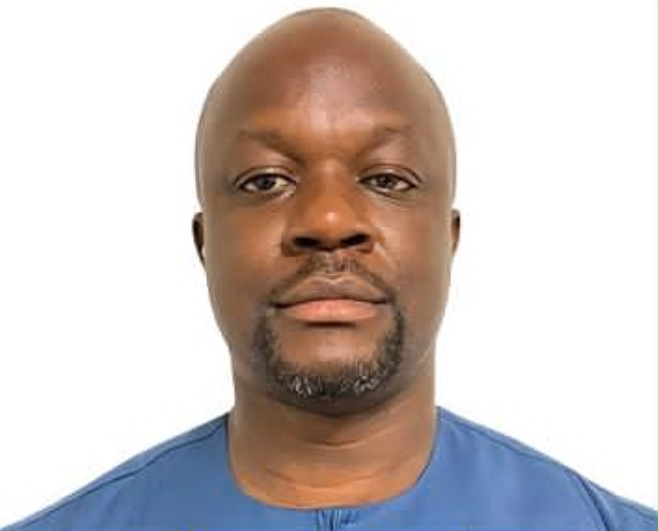By Cyllo Wise
The Sierra Leone People’s Party (SLPP), one of the oldest and most influential political entities in Sierra Leone, is currently undergoing a constitutional review under the leadership of President Julius Maada Bio. This process, ostensibly aimed at modernizing and streamlining the party’s operations, has sparked significant controversy and debate within and outside the party. Critics argue that the review is less about reform and more about consolidating power within the hands of a select few, including President Bio and his close allies. This article delves into the SLPP’s constitutional review, examining its implications for internal democracy, party unity, and the broader political landscape of Sierra Leone.
The SLPP’s constitutional review was initiated with the stated goal of updating the party’s internal governance structures to reflect contemporary political realities. According to the party leadership, the review is necessary to address challenges such as internal factionalism, inefficiencies in decision-making, and the need to realign the party’s strategies with its long-term vision.
However, the timing and the manner in which the review has been conducted have raised several red flags. The process has been largely driven by a small committee, handpicked by President Bio, which has led to accusations of bias and a lack of transparency. Moreover, key party stakeholders, including grassroots members and veteran politicians, have expressed concerns about being side-lined in the review process. These concerns have only been exacerbated by the fact that the review comes at a time when the SLPP is facing significant internal and external pressures, including the aftermath of a contentious general election and increasing public dissatisfaction with the government’s performance.
One of the most significant criticisms of the SLPP’s constitutional review is that it appears to be driven by a desire to consolidate power within a narrow circle of elites, centred around President Bio. The proposed changes to the party’s constitution, which include altering the mechanisms for electing party officials and determining the party’s flagbearer, have been widely interpreted as moves designed to entrench the current leadership’s hold on power.
For instance, one of the key proposals is to grant the party leader (currently President Bio) greater control over the selection of candidates for key positions within the party. This would effectively diminish the role of the party’s broader membership in decision-making processes, centralizing power within the leadership. Such a move is seen as an attempt to stifle dissent within the party and to ensure that only those loyal to President Bio and his inner circle are able to rise through the ranks.
This power consolidation agenda is particularly concerning given the SLPP’s historical commitment to internal democracy and inclusivity. The party, which played a crucial role in Sierra Leone’s struggle for independence, has long prided itself on its democratic credentials. However, the current constitutional review threatens to undermine these principles, turning the SLPP into a vehicle for the ambitions of a few rather than a platform for broad-based political engagement.
Internal democracy within political parties is essential for the healthy functioning of a democracy. It ensures that diverse views are represented, that leaders are held accountable, and that the party remains responsive to the needs of its members and the electorate. Unfortunately, the SLPP’s constitutional review seems poised to erode these democratic principles.
One of the most glaring examples of this is the proposed changes to the process for selecting the party’s presidential candidate, or flagbearer. Traditionally, the SLPP has used a system that allows for a broad participation of party delegates in choosing the flagbearer, ensuring that the candidate reflects the will of the party’s base. However, the new proposals seek to limit this process by giving more power to the party leader and the National Executive Council (NEC) in determining the flagbearer. This not only reduces the influence of ordinary party members but also increases the risk of the process being manipulated by those in power to favour a particular candidate.
Furthermore, the review process itself has been criticized for lacking transparency and inclusivity. Many party members have reported being excluded from consultations, with key decisions being made behind closed doors. This has led to accusations that the review is being conducted in a manner that prioritizes the interests of the current leadership over those of the party as a whole. Such practices undermine the very foundation of internal democracy and risk alienating a significant portion of the party’s base.
The SLPP has long been plagued by internal factionalism, with various groups vying for control and influence within the party. This factionalism has often spilled over into the public sphere, leading to divisions that weaken the party’s ability to govern effectively. Unfortunately, the current constitutional review seems more likely to exacerbate these divisions than to heal them.
By concentrating power in the hands of the current leadership, the review risks alienating those who feel marginalized or excluded from the decision-making process. This includes not only grassroots members but also influential party figures who have long been critical of President Bio’s leadership style. The result could be a further fragmentation of the party, with disgruntled members forming breakaway factions or defecting to rival parties.
Such a scenario would be disastrous for the SLPP, particularly at a time when it faces significant challenges both from within and without. The party’s internal divisions have already been laid bare in recent years, with public disagreements and power struggles making headlines. A constitutional review that deepens these divisions could lead to a complete breakdown of party unity, making it difficult for the SLPP to present a cohesive front in future elections.
Moreover, the review’s focus on consolidating power at the top could lead to a sense of disillusionment among the party’s rank-and-file members. If ordinary members feel that their voices are not being heard and that their concerns are not being addressed, they may become disengaged from the party altogether. This could lead to a decline in party membership and activism, further weakening the SLPP’s position in the political landscape.
The implications of the SLPP’s constitutional review extend beyond the internal dynamics of the party. Given the SLPP’s prominence in Sierra Leone’s political landscape, the review has the potential to impact the country’s broader democratic processes and governance.
One of the key concerns is that the review could set a dangerous precedent for other political parties in Sierra Leone. If the SLPP, a party with a long history of democratic principles, can move towards centralizing power and undermining internal democracy, it could encourage other parties to do the same. This could lead to a broader erosion of democratic norms in Sierra Leone, with political parties becoming more authoritarian and less responsive to the will of the people.
Furthermore, the review could have serious implications for the 2028 general elections. If the SLPP emerges from the review process more divided and less democratic, it could struggle to mount an effective campaign and retain the support of the electorate. This could open the door for rival parties, such as the All People’s Congress (APC), to capitalize on the SLPP’s weaknesses and make significant gains. The result could be a more polarized and unstable political environment, with potentially negative consequences for Sierra Leone’s governance and development.
Additionally, the SLPP’s constitutional review has raised concerns about the concentration of power in the hands of President Bio. By centralizing decision-making processes and reducing the influence of other party members, the review could lead to an increasingly autocratic style of leadership within the SLPP. This, in turn, could have a spillover effect on the broader governance of the country, with President Bio potentially extending this centralization of power to the national level. Such a development would be deeply concerning for Sierra Leone’s democracy, which has made significant strides in recent years but remains fragile.
Given the significant concerns raised by the SLPP’s constitutional review, there is an urgent need for a rethink of the process. The current approach, which seems designed to entrench the power of a select few, is likely to do more harm than good to the party and the country as a whole. Instead, the review should be conducted in a manner that is transparent, inclusive, and reflective of the party’s democratic principles.
One of the first steps in this process should be to broaden the consultation process, ensuring that all voices within the party are heard. This includes not only senior party members but also grassroots activists, women, and youth, who are often marginalized in such discussions. By engaging with a wider range of stakeholders, the SLPP can ensure that the review process reflects the diverse views and interests of its membership.
Furthermore, the party should reconsider some of the more controversial proposals, such as those that seek to centralize power within the leadership. Instead, the focus should be on strengthening internal democracy, ensuring that decision-making processes are transparent and that all members have a say in the party’s future. This could include retaining the current system for selecting the party’s flagbearer or even expanding the role of party members in key decisions.
Finally, the SLPP should recognize that its constitutional review is not just an internal matter but one that has broader implications for Sierra Leone’s democracy. As such, the party has a responsibility to ensure that the review process upholds the principles of democracy, accountability, and inclusivity. By doing so, the SLPP can set a positive example for other political parties in the country and contribute to the strengthening of Sierra Leone’s democratic institutions.
The SLPP’s constitutional review under President Bio has raised serious concerns about the future of the party and its commitment to democratic principles. While the review was initially presented as a necessary step to modernize the party, it has increasingly become clear that it is being used as a tool to consolidate power within a narrow circle of elites. This approach threatens to undermine internal democracy, deepen factionalism, and weaken the party’s position in the broader political landscape.
For the sake of the SLPP’s future and the health of Sierra Leone’s democracy, it is crucial that the party reconsiders its approach to the constitutional review. By embracing transparency, inclusivity, and a genuine commitment to democratic principles, the SLPP can avoid the pitfalls of power consolidation and ensure that it remains a strong, united, and democratic force in Sierra Leonean politics. This is not just a matter of internal party governance but a necessary step to safeguard the democratic foundations of the country as a whole. Only by doing so can the SLPP continue to play a positive role in the development and progress of Sierra Leone.











